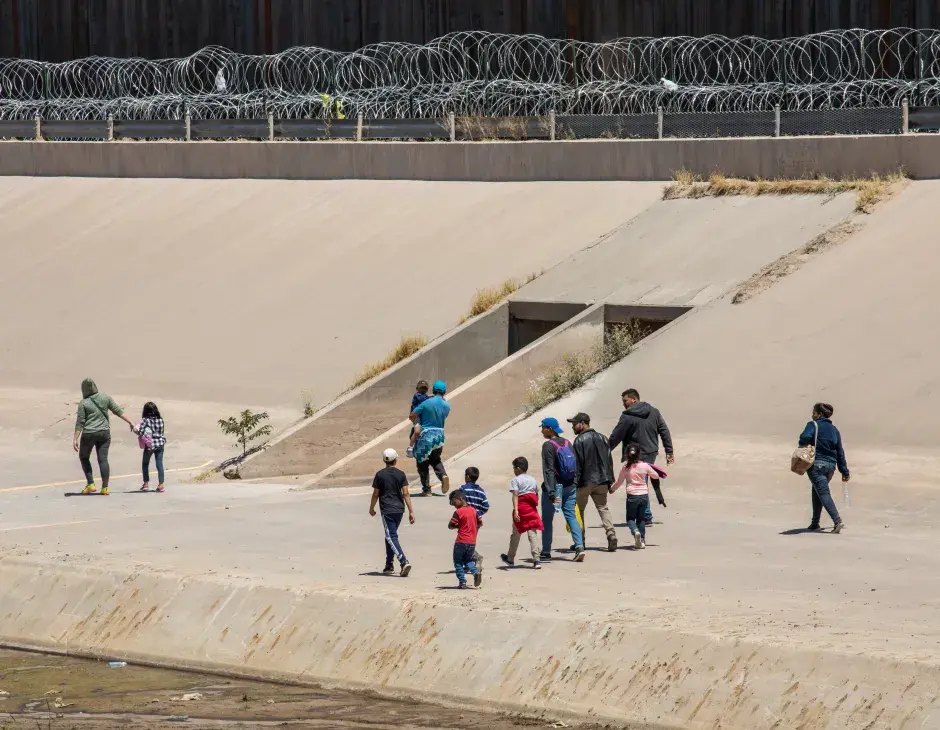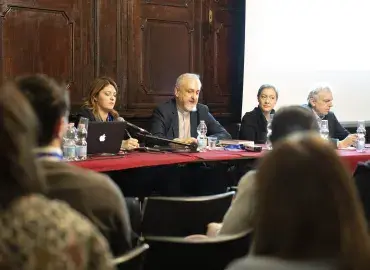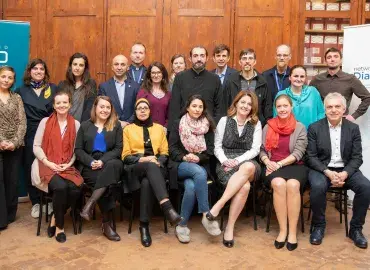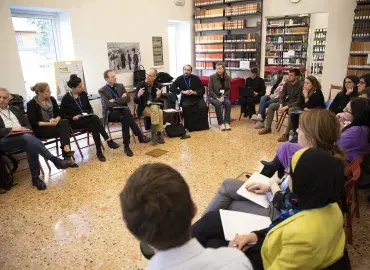The importance of establishing formal and innovative approaches to education to empower refugees and migrants set the agenda for a two-day workshop last week.
The virtual workshop, “Informing and inspiring a new age of Digital Education for refugees and migrants in Europe,” was marked by the KAICIID-sponsored Network for Dialogue’s collaboration with SIRIUS – Policy Network on Migrant Education, an EU-founded membership-based organization located in Brussels that promotes the social inclusion of children and young people from migrant backgrounds in Europe by improving their access to the universal right to education.
The workshop was held under the auspices of KAICIID’s Europe Region programme and its Social Cohesion Initiative.
The event drew prominent policymakers working for a host of European ministries, as well as international organizations such as the United Nations High Commissioner for Refugees (UNHCR) and the International Centre for Migration Policy Development (ICMPD).
Attendees spoke about some of the challenges currently faced by migrant students and their parents in countries across Europe. “After the recession in 2008, support for migrant students was watered down,” said Mary Ryan, Chairperson of the NGO Immigrant Parents and Guardians Support Association, which supports immigrant parents in accessing information regarding the educational system in Ireland.
“While some of it has been restored, it is not adequate,” she added. “Migrant students’ reception is really dependent on individual schools, individual teachers, individual principals or individual initiatives that are being run, and there are some excellent projects being run in Ireland, but too many migrant students are falling between the cracks.”
The online workshop gathered 15 participants from KAICIID’s Network for Dialogue and 20 participants from the SIRIUS Network, including civil society and faith-based organizations, teachers, academics, refugee and migrant background parents, and policymakers. Participants included those from Bulgaria, Ireland, Slovenia, Poland, Austria, Greece and Serbia, Switzerland, Italy and Norway.
“Our main aim was to convene a space for dialogue between policymakers and members of the Network for Dialogue and SIRIUS, exploring how digital education can support inclusive education of refugees and migrants”, said Dr. Aleksandra Djuric Milovanovic, Network for Dialogue Project Manager. “Bringing these actors together allowed to work on concrete ideas in certain European countries on how the digital divide can be overcome in education during COVID-19 but also beyond the pandemic.”
Setting concrete goals for implementation
While the emphasis was on facilitating an immersive learning experience through peer learning, dialogue with other policymakers and education specialists was high on the agenda. The workshop also made use of small multi-stakeholder planning teams which helped policymakers and experts develop SMART goals with a view to implementing them after the workshop.
Agenda items during the workshops included, finding holistic support in education and dialogue with policymakers, the use of academic and social languages in the absence of face to face schooling, the importance of providing wider educational support for refugees in centresand newly-arrived migrants, as well as recommendations about how educators and policymakers could support and dialogue with migrant parents and communities.
Attendees spent the second day of the workshop researching and recommending a series of SMART goals to enhance education for migrant children. A number of these goals emerged ready for implementation.
“Our SMART goal is to organize a stakeholder workshop in Austria so teachers can get an advanced training or education to offer the first language classes in digital throughout Austria,” said Nadine Punz, a teacher at a New Middle School Vienna, Austria. “We thought of stakeholders like the Ministry of Education, diversity managers and teachers, first language teachers and researchers and of course, representatives of parents and students and communities like the Arab community, the Turkish community.”
The online workshop also marked an important opportunity to have a dialogue between policymakers and practitioners on the uses of digital education and how it could be adapted for universal benefit in the near future. The global coronavirus pandemic, which has resulted in 3 million deaths worldwide, saw face to face access to education halted for most of 2020 in countries around the world. While the COVID-19 tragedy has fast tracked the promise of greater accessibility through digital learning – which mirrors a major trend towards the adoption of digital education across Europe – there is currently limited knowledge at a policy level on how to ensure an inclusive education for refugee and migrant children in this digital world.
Research from last year’s school closures due to the COVID -19 pandemic point to some glaring educational disparities between children of different backgrounds. According to one McKinsey report, the pandemic has taken an especially heavy toll on Black, Hispanic, and Indigenous communities. According to the report, students of colour were found to be about three to five months behind in their learning, while white students were about one to three months behind.
Attendees spoke about some of the most pressing problems facing migrant children and their families during the pandemic. “The problem of framing how to deal with migrant families is seen as a problem and not as an opportunity,” said Ilaria Ungaro, a human rights activist from Lombardy, Italy. “We also identified problems of digital literacy, the different levels of digital literacy in the families and that this problem was increased during the pandemic when everything went online. So it became even more difficult to dialogue with families and teachers and also to support students.”
“Informing and inspiring a new age of Digital Education for refugees and migrants in Europe” set out to achieve a number of objectives. These included making improvements in how policymakers and practitioners can be more inclusive in their own national digital education plans and actions by using dialogue; strengthening of capacity of Network for Dialogue members in the field of education, as well as developing a network for Ministries of Education and practitioners to improve their digital education work.
Some of the attendees emerged from their workshop groups with plans for advocacy campaigns in their home countries. “Based on our knowledge on good practices, we decided to work on dual education,” said Bistra Ivanova, chairperson of the NGO Multi Kulti Collective in Bulgaria, which works to enhance migrant and refugee integration, community development and education.
“We decided to create an advocacy campaign to put this topic on the agenda with the ministry, with other stakeholders, so we created a plan how to implement this. We put very particular measurable indicators on developing a document with international experts,” she added.
“As a network, SIRIUS is thrilled with the workshop’ssuccess and the learnings gathered. We hope that our findings will influence the continued reiteration and implementation of both the EU Digital Education Action Plan and the European Education Area initiatives,” saidMialy Dermish, Executive Director of the SIRIUS Network. “Inclusion is a must for a happy, healthy and resilient Europe, not only through this continuing pandemic, but also given the trend towards more online learning shown by national governments and the European Commission”.
Partnership between faith based organizations and secular institutions can greatly improve integration conditions for migrants…
Newly launched “Network for Dialogue” aims to support more effective integration policies in Europe
…
Network for Dialogue workshop takes place in Bologna, defines way forward and membership
The Network…





